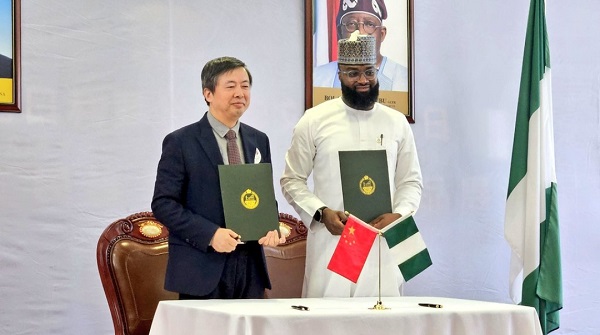
In a significant milestone, the National Agency for Science and Engineering Infrastructure (NASENI) has signed three memoranda of understanding (MOUs) and received 10 letters of intent at an event attended by Vice President Kashim Shettima.
These documents were signed during the 3rd Belt and Road Initiative Forum in Beijing, China, to mark a new era of collaboration between NASENI and Chinese companies, focusing on projects valued at a substantial USD2 billion.
The MOUs signify NASENI’s willingness to partner with leading Chinese companies that are ready to invest in Nigeria. The three Chinese firms entering into these partnerships are Shanghai Launch Automotive Technical Co Ltd., to establish a facility for the production of new energy electric vehicles, reinforcing Nigeria’s commitment to new energy automobiles; China Great Wall Industry Corporation, engaging in the facilitation of turnkey deliveries of unmanned aerial vehicles (UAVs) assembly line projects, enhancing the development of indigenous drone technology and Newway Power Technology Company Ltd, who will be collaborating for technology transfer, focusing on lithium batteries, electric vehicles and allied technologies. This collaboration underscores the commitment to fostering advancements in clean energy and electric vehicle technology.
Beyond these MOUs, 10 additional Chinese enterprises presented letters of intent to Shettima, expressing their interest in forging partnerships with NASENI for various technology and industrial innovation projects. Collectively, these projects are valued at a remarkable USD 4 billion and encompass several vital sectors, such as energy (solar, natural gas, microgrids), vehicle production, training, technology transfer, drone technology and the development of a new industrial park.
The executive vice chairman of NASENI, Mr. Khalil Halilu who signed the agreements on behalf of NASENI, described this event as a significant milestone in the organisation’s recent endeavours. He emphasised, “This is a very important day for us at the National Agency for Science and Engineering Infrastructure because it is a day to show the results of some of the work that we have been doing in the last six weeks since I assumed the leadership of NASENI.”
Halilu went on to explain that these agreements, both MOUs and letters of intent, have the potential to bring USD 2 billion worth of new investments into Nigeria. These investments will translate into job creation, skills development, technology transfer and the possibility of exports and foreign exchange earnings. Moreover, they will contribute to the growth of local economies.
The NASENI EVC underscored the core principles driving the organisation’s approach: collaboration, creation and commercialisation. He emphasized that NASENI’s goal is to forge partnerships, create innovative products through collaboration, and then bring these products to market in a commercially viable and profitable manner.
Halilu made it clear that NASENI is committed to transforming innovative ideas into practical and profitable products that can drive industrialisation, development and prosperity in Nigeria. He stressed, “Innovation is not meant for the shelves or the archives. It should translate into usable products. This is our belief and one of our driving principles at NASENI”.
Halilu expressed his gratitude to President Bola Tinubu, the chairman of the governing board of NASENI and Vice President Kashim Shettima, for their steadfast support and encouragement. He assured that the confidence vested in him and NASENI would not be misplaced.
The director of information at NASENI, Segun Ayeoyenikan shared details about the Chinese companies that submitted letters of intent to Shettima. These companies represent various sectors, from solar products to vehicle design and production, energy technology (CNG, LNG, methanol), building technology, natural gas infrastructure, vocational training, smart grids, microgrids, drone technology transfer, clean energy utilisation and the development of a new industrial park. These collaborations promise a brighter future for technology and innovation in Nigeria, forging a stronger partnership between Nigeria and China.


